“It’s so hard to explain something that feels so sacred to you,” Amanda Pot said when asked to describe Single Moms’ Camp at Hidden Acres Mennonite Camp in New Hamburg, Ontario. Pot has been running the camp for over a decade. “[It’s] absolutely exhausting,” she said, “but I wouldn’t trade it for anything.”
Single Moms’ Camp has been part of Hidden Acres for over 40 years. Low-income single moms and their children are selected through key partnerships with various organizations in the Waterloo Region and beyond. The kids attending camp are ages 5 to 12. They have a regular camp experience, sleeping in cabins, canoeing, swimming, singing and learning about God’s love.
The moms each stay in their own room and experience plenty of “moms only” time. Staff strive to make the moms feel their own self worth and dignity. The camp includes a mom spa, a coffee house evening with decadent desserts and handmade drinks, and a shopping trip to the local Mennonite Central Committee thrift store.
The “Moms’ Focus” time is also central. It includes music, discussions and a craft. Pot says the “majority of women who come to this camp have some level of trauma,” so she regards Moms’ Focus as time to create a safe, welcoming space. “They come feeling so much, and we want them to know when they leave that they have a sense of belonging, and they are worthy of that belonging.”
Each year, Pot plans a different craft for Moms’ Focus. While Pot holds the belief that everyone has creativity in them, each year a few moms walk away from the craft before it’s finished, or choose not to participate at all. This year was different.
The craft was Kintsugi, which means “golden joinery” in Japanese. Kintsugi is the art of repair, practiced by piecing together broken pottery with gold or sliver in the glue. Pottery is made whole, with its brokenness a highlighted part of its history.
The activity is meant as a reflection on oneself, into places that have been healed or need healing, and the acceptance of that process as a beautiful part of who a person is. While Pot planned and prepared, there were “many things along the way that pointed to God.” She says: “I can’t really explain it, but I think that God sees and directs, and is in all planning.”
While sourcing pottery bowls, Pot connected with a local potter who was also a single mom. Pot explained the camp and the craft. Then she asked permission to break the bowls she would purchase. The potter delightedly told her, “I want you to break my bowls.” She also reduced the price.
During a prayerful labyrinth walk that Pot did in the time before the camp, Pot had received the phrase “don’t rush.” This phrase came back to her when she did a trial run of the Kintsugi craft that turned out to be “disastrous.” After breaking the bowl, she immediately began gluing it back together. The pieces wouldn’t stay together; the glue refused to hold. The words “don’t rush,” echoing in her mind, only made the experience more infuriating. Cursing with frustration, she decided she needed to take a break, and as she left the table where she had been working, the cloth under her bowl caught, sending everything flying and shattering into double the number of pieces.
It felt prophetic. Pot wept for the women she was preparing for. “It’s like these moms, who think their lives are coming together and they fall apart again,” she reflected.
After stepping back for some time to process, Pot realized she had rushed because she didn’t want to think about the cracks. “We want to skip to the end,” she said, “to wholeness and beauty.”
She had prepared the materials for the activity, but she had not prepared herself. Pot returned to her trial bowl. She slowed down, prayed, used a different glue and prepared herself. Even with double the pieces, it took far less time to reassemble the bowl.
When Pot offered the craft to the women at camp, “it was peaceful and sacred,” she said. Each woman addressed their craft individually, taking their own time, and in the end, loving the process as well as the result. Pot explained that “gold is to enhance or highlight the cracks,” not to cover them up.
She had left a few small holes in her own bowl, and when showing the moms at camp, one woman said, “look, that’s where the light comes in.”
“I love that they were doing this activity together,” said Pot. “They can see they are not alone in this, and that we all have cracks, and we all need to be put back together. The hardest thing can be to come to terms with that it takes time, and we can’t rush it.”
One woman sat for a good half hour with her unbroken bowl. Pot asked her why she waited so long, and she answered, “I’m just so tired of being broken.” Then she broke it. Don’t rush.
Unlike crafts other years, every woman participated.
Camp is an incredible experience each year, says Pot, but this year was special. The moms were “like sponges,” she said, “they couldn’t wait to hear what [was] next.” They were determined to find healing, to be better and to see their kids benefit from it.
Pot said her takeaway from this year is a deeper understanding that “God sees every single person, always, always. . . . The world is so overwhelming and crappy, but we are seen and held.”
A.S. Compton lives in Waterloo, Ontario, and serves as part of the Canadian Mennonite staff.

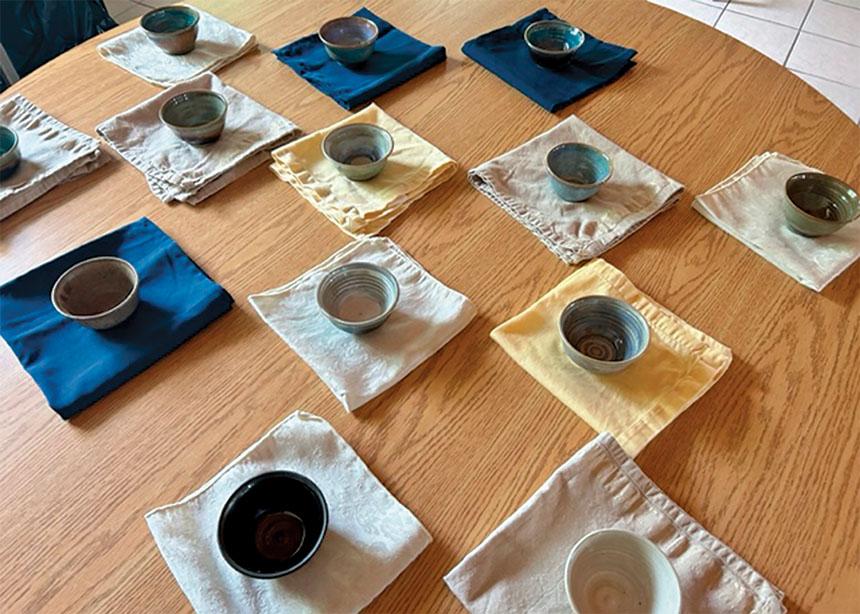
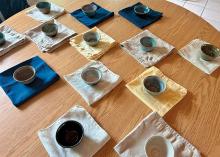
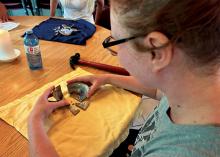
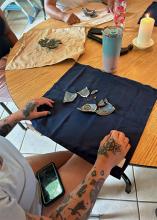

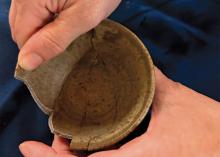
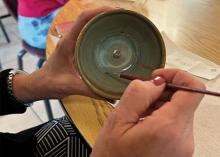
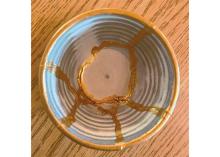
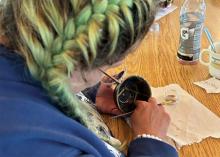
Add new comment
Canadian Mennonite invites comments and encourages constructive discussion about our content. Actual full names (first and last) are required. Comments are moderated and may be edited. They will not appear online until approved and will be posted during business hours. Some comments may be reproduced in print.